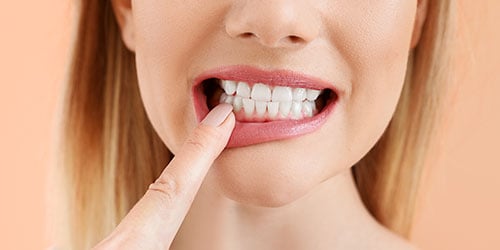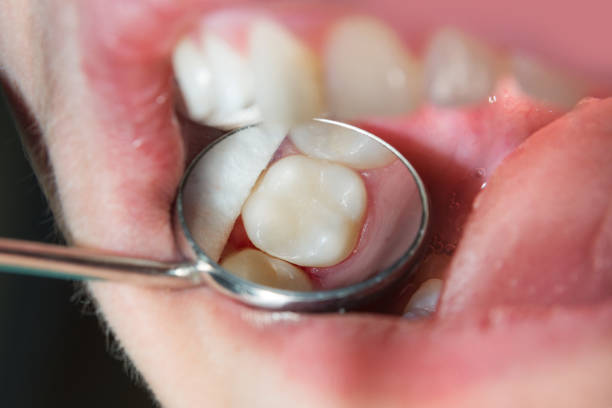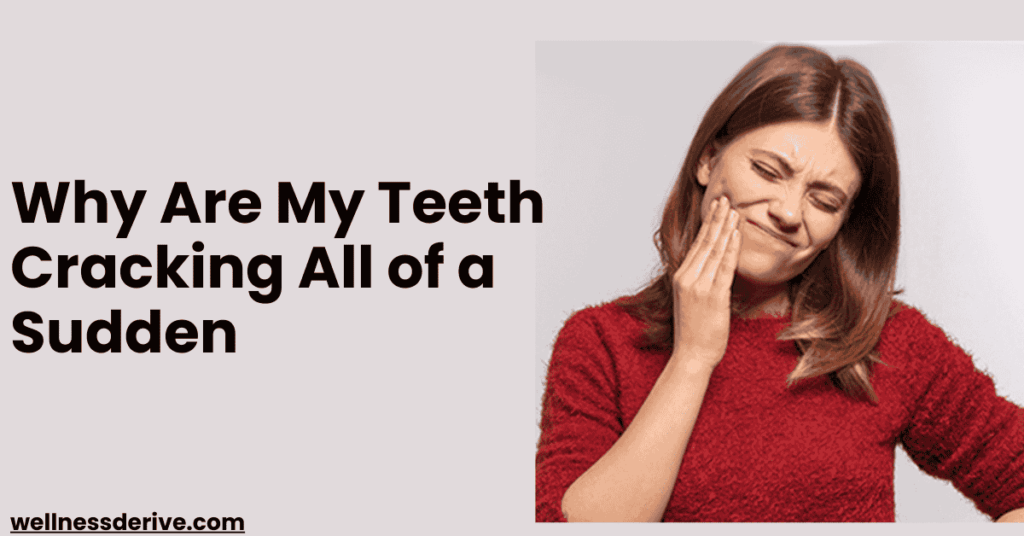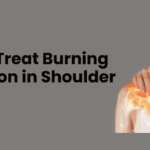Have you noticed your teeth cracking all of a sudden? If so, you’re not alone. Many people experience sudden changes in their oral health, often wondering, “Why are my teeth cracking all of a sudden?” This issue can be alarming, especially if you’ve had healthy teeth before. In this guide, we’ll explore the possible causes, symptoms, and treatment options for cracked teeth, along with tips to prevent further damage.
Also Read: How Bad Is Wisdom Teeth Removal Without Anesthesia?
Why Are My Teeth Cracking All of a Sudden?
Teeth cracking unexpectedly can result from a variety of factors. Here are some of the most common causes:
1. Teeth Grinding (Bruxism)

Teeth grinding or clenching, especially during sleep, exerts excessive pressure on teeth, leading to cracks or fractures. Chronic bruxism wears down the enamel and weakens the teeth over time.
Signs of Teeth Grinding:
- Worn-down teeth
- Jaw pain or headaches upon waking
- Chipped or cracked teeth
Solution: Use a mouthguard at night to protect your teeth and reduce grinding.
2. Weakened Enamel Due to Age

As we age, the enamel (the hard outer layer of the teeth) naturally wears down. This makes teeth more prone to cracking and chipping, especially when biting hard foods.
Solution: Maintain good oral hygiene, avoid chewing on hard objects, and consult a dentist for protective dental treatments like fluoride applications.
3. Biting Hard Foods or Objects
Eating hard foods like nuts, hard candy, or ice can put undue pressure on teeth, causing them to crack. Even chewing on non-food items like pens or pencils can cause cracks in teeth over time.
Solution: Avoid chewing on hard items and opt for softer food options. If you must eat hard foods, do so slowly and with caution.
4. Sudden Temperature Changes
Drastic temperature changes from eating hot food and immediately drinking something cold can cause teeth to expand and contract. This sudden change can lead to small cracks known as craze lines.
Solution: Avoid exposing your teeth to extreme temperature changes. Rinse your mouth with lukewarm water after meals to maintain a stable environment.
5. Dental Decay and Cavities

Tooth decay weakens the tooth’s structure, making it more likely to crack. Cavities that are left untreated can grow large, causing portions of the tooth to break off.
Solution: Visit your dentist for regular checkups. If you have cavities, get them filled to prevent further decay and possible fractures.
6. Large Dental Fillings or Restorations
Large fillings or old dental restorations can weaken the structural integrity of a tooth. Over time, these restorations can cause the tooth to crack under pressure.
Solution: Ask your dentist if any of your old fillings or crowns need to be replaced. Modern materials are often stronger and more durable.
7. Tooth Injury or Trauma
Accidents, falls, or direct impact on the mouth can cause a tooth to crack or chip. Even a minor injury can lead to small fractures that worsen over time.
Solution: Wear a mouthguard when playing contact sports and visit a dentist immediately after a dental injury.
8. Poor Oral Hygiene and Enamel Erosion
Poor oral hygiene can lead to plaque and tartar buildup, which contributes to enamel erosion. Weakened enamel increases the risk of cracks and fractures.
Solution: Maintain proper oral hygiene by brushing twice a day, flossing daily, and visiting your dentist regularly for cleanings and checkups.
9. Medical Conditions (Like Acid Reflux or GERD)
Acid reflux causes stomach acid to flow back into the mouth, eroding tooth enamel. This erosion makes teeth more vulnerable to cracks and fractures.
Solution: Manage acid reflux with dietary changes and medications. Use a fluoride mouthwash to strengthen teeth against acid exposure.
Also Read: What Happens If You Don’t Brush Your Teeth with Braces?
Symptoms of Cracked Teeth
If your teeth are cracking, you may experience one or more of the following symptoms:
- Sharp pain when biting or chewing
- Sensitivity to hot, cold, or sweet foods
- Intermittent pain that comes and goes
- Visible cracks, chips, or rough edges on the teeth
- Pain when releasing pressure after biting
If you experience any of these symptoms, see a dentist for an evaluation.
Also Read: Best Floss for Tight Teeth
Treatment for Cracked Teeth
The treatment for cracked teeth depends on the severity and location of the crack. Here are some treatment options:
1. Bonding
For small cracks, dental bonding can be used to fill and seal the crack. This option works well for surface cracks and minor chips.
2. Dental Crowns
If a larger portion of the tooth is cracked, a crown may be placed over the tooth to restore its shape and strength.
3. Root Canal
If the crack reaches the tooth’s pulp (nerve), a root canal may be needed to remove the infected tissue and save the tooth.
4. Extraction
For severe cracks that reach below the gum line, the tooth may need to be extracted and replaced with a dental implant or bridge.
Prevention Tips to Avoid Cracked Teeth
- Avoid Hard Foods: Don’t chew on ice, hard candy, or other hard objects.
- Wear a Mouthguard: If you grind your teeth at night or play contact sports, wear a mouthguard to protect your teeth.
- Maintain Good Oral Hygiene: Brush, floss, and schedule dental checkups to avoid cavities and tooth decay.
- Limit Acidic Foods and Drinks: Acidic beverages like soda and fruit juices erode enamel, making teeth more vulnerable to cracking.
When to See a Dentist
If you experience persistent pain, sensitivity, or visible cracks, see a dentist immediately. Early treatment prevents the crack from worsening, saving you from more extensive (and expensive) procedures later.
Conclusion
Cracked teeth can be caused by factors such as grinding, weakened enamel, poor hygiene, or sudden trauma. Recognizing the symptoms early and seeking prompt dental care can prevent further damage. Treatment options range from dental bonding to root canals, depending on the severity of the crack. Protect your teeth by avoiding hard foods, wearing a mouthguard, and maintaining good oral hygiene. If you’re wondering, “Why are my teeth cracking all of a sudden?”, consult your dentist for a professional evaluation.
Disclaimer: The content on Wellness Derive is for informational purposes only and not a substitute for professional medical advice, diagnosis, or treatment. Always consult a healthcare provider for medical concerns.



